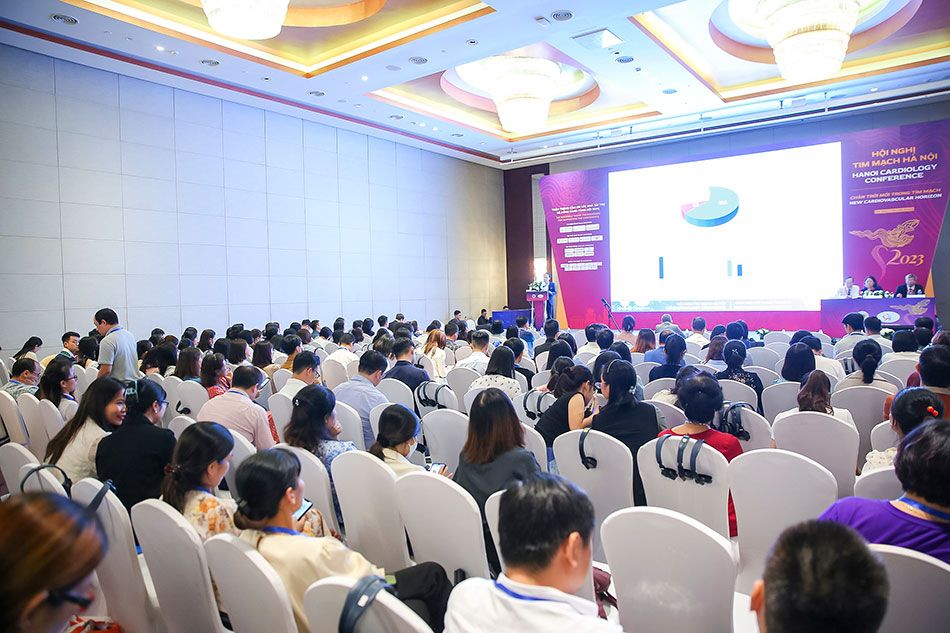On September 30th, two doctors from FV Hospital participated in the 2023 Hanoi Cardiology Conference in the roles of chairperson and presenter, respectively: Ho Minh Tuan, MD, PhD, Head of Cardiology Department and Nguyen Viet Quynh Thu, MD, MSc, Specialist Level II, Head of Dietetics & Nutrition Department
The conference, organised by the Hanoi Cardiology Association in collaboration with Hanoi Heart Hospital, was titled “New Cardiovascular Horizons” and was attended by nearly 2,000 professors, doctors, pharmacists, and medical experts from Vietnam, the United States, France, Singapore, Japan, and South Korea.

“New Cardiovascular Horizons” was organized by the Hanoi Cardiology Association in collaboration with Hanoi Heart Hospital.
Modern Advancements in the Treatment of Cardiovascular Diseases
During the conference, Ho Minh Tuan, MD, PhD, was invited as a chairperson for session F03, which focused on “Surgical management of AMI.” He presented a report titled “Management of ST elevation AMI with ventricular septal rupture” in this session. Additionally, Dr Tuan delivered another notable presentation: “Treatment of Hypertrophic Cardiomyopathy with Severe Heart Failure by Alcohol Septal Ablation.”
Nguyen Viet Quynh Thu, MD, MSc, Specialist Level II presented her talk Titled “Nutrition In Obese Patients With Cardiovascular Complication” during another conference session.

Ho Minh Tuan, MD, PhD, Head of Cardiology at FV Hospital, attended as chairman and presenter.
Dr Tuan shared his insights about the conference, stating, “At FV, we have successfully received and treated many patients with severe and rare heart conditions using new methods. This conference is an opportunity for us to share our experiences with our colleagues so that we can continue to find the best solutions for our patients.” Both of Dr Tuan’s presentations focused on minimally invasive cardiac interventions. These methods provide quick and less invasive treatments but require modern equipment support, including a Cathlab facility, and a professionally trained and experienced medical team.
In his presentation during Session F03, Dr Tuan elaborated on the treatment of patients with septal rupture following myocardial infarction. This is a rare cardiac complication, occurring in only about 1 in 500 to 600 heart attack patients. However, without intervention, the one-month survival rate for such patients is only six per cent. Dr Tuan’s method, performing a percutaneous coronary intervention through the skin, is considered a modern and less risky alternative to the traditional surgical approach.
In his other presentation related to heart failure, Dr Tuan discussed cases of successful treatment at FV for patients with heart failure caused by hypertrophic cardiomyopathy. He shared the latest updates in using a percutaneous coronary intervention technique called “branch puncture” to address the blockage. Approximately 46 per cent of patients with hypertrophic cardiomyopathy are at risk of heart failure. Dr Tuan emphasised that this procedure is highly regarded as it helps reduce the risk of heart failure for patients with hypertrophic cardiomyopathy. Heart failure is a complex condition with various causes, making it a significant challenge in today’s medical field.
Screening and prevention of cardiac diseases need more attention.
According to statistics from the Ministry of Health, in Vietnam, around 200,000 people die from heart diseases each year, accounting for 33% of total deaths. According to the Vietnam Heart Institute, from 2000 to 2015, the prevalence of high blood pressure in adults increased by approximately 1% annually, affecting 25% of adults. This means that about one in every four adults has high blood pressure.
In her presentation, Dr Nguyen Viet Quynh Thu discussed the “connection” between obesity and heart diseases. She outlined methods to evaluate overweight and obese individuals and provided detailed information on nutrition for obese patients, especially those with heart-related complications. Dr Thu emphasized that obesity (with a BMI of 29 kg/m2 or higher) not only carries a high risk of heart disease (34%) but is also a contributing factor to various other health issues such as diabetes (61%), hypertension (17%), gallstones (30%), and more.

Nguyen Viet Quynh Thu, MD, MSc, Specialist Level II, Head of Dietetics & Nutrition at FV Hospital, presents at the conference.
At the conference, Dr Quynh Thu shared, “Effective weight control can prevent many dangerous diseases. For heart disease patients, preventing or treating obesity is especially important.” In addition, Dr Thu proposed the weight control and obesity treatment process being applied at FV. This process combines dietary regimens, exercise programmes, and, in some cases, stomach reduction surgeries. So far, the obesity treatment strategies at FV have yielded good results, helping patients control their weight and the complications caused by obesity.
Also at this conference, from the organisers’ side, Nguyen Sinh Hien, MD, PhD (Chairman of the Hanoi Heart Association, Director of Hanoi Heart Hospital) noted that heart disease has been the leading cause of death for humanity for many years, even more than cancer. Currently, the risks of high blood pressure, coronary artery disease, strokes, and more have appeared in people aged 30 to 40, with some cases appearing in patients under 30. It’s worth noting that as many as 44.3% of people aged 25-74 in urban areas have high blood cholesterol and this rate tends to increase with age.
Given this current situation, Ho Minh Tuan, MD, PhD, advises that people should pay attention to heart health from a young age to avoid becoming “victims” of this disease. This can be done by controlling weight, avoiding smoking, limiting consumption of animal fats, salt, alcohol, managing stress, and staying physically active. Regularly monitoring blood pressure and screening for risks such as blood sugar disorders and lipid imbalances are also essential. A healthy lifestyle can contribute to better heart health.



